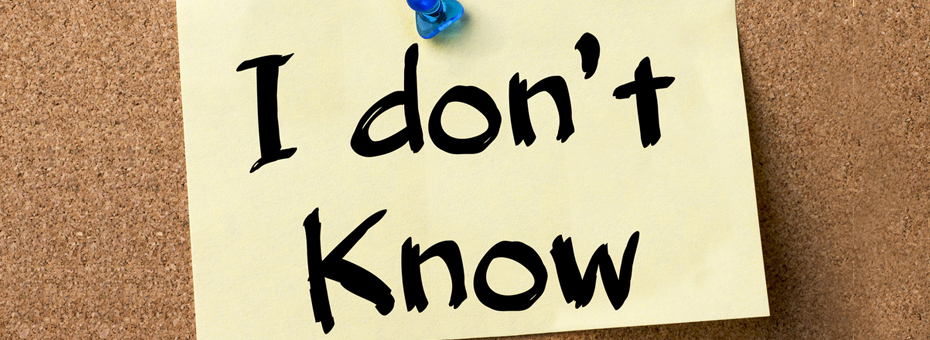Helen Kales, MD is a professor of psychiatry with the University of Michigan Health System. Recently she wrote a terrific blog describing her experiences with an important set of words: “I don’t know.”
Fear of appearing incompetent in front of a group has probably deterred most of us from saying “I don’t know” at least once in our lives. Dr. Kales describes a simulated flow exercise she experienced during a lean healthcare training session at the University of Michigan. Her group struggled to achieve the required flow, yet when the facilitators asked them what they thought was wrong, the group automatically started spewing out possible answers. It was only after the group admitted, “We don’t know” that they took a step back, examined all the possibilities, and finally came to an unexpected “ah-ha!” moment.
The simulation caused Dr. Karas to recall several real-world experiences, including a personal situation that called for an unintuitive but crucial “I don’t know.” Amid fears that her son Theo had been born prematurely, causing apneas and clubfoot, doctors ran a battery of negative tests, as though determined to prove there was something wrong with him. It all culminated with a doctor telling Dr. Kales that Theo “probably” had a debilitating neurological disorder that would impact him throughout his life. The reality? You guessed it: the family’s regular pediatrician admitted she didn’t know what (or if) anything was “wrong” with Theo. And lo and behold, Theo’s breathing problems lasted all of another month before resolving. He now lives a happy, healthy life.
Dr. Kales’ article raises an interesting question: When was the last time that you felt completely comfortable saying, “I don’t know?” Even if you’re okay saying that, have you ever felt a small twinge of guilt over having to ask for help? If that made you pause and scratch your head, you’re not alone. Why does it seem like there’s a stigma attached to admitting we don’t understand something? Are we afraid of coming off as incompetent or burdensome?
Fear of saying, “I don’t know” is indicative of a serious organizational illness.
The day that employees are reluctant to ask for help is the day that their organization ceases to be lean. It’s important to identify it early and address it at its source.
For me, too, one of my first lean lessons was about the power of “I don’t know.” Way, way before I joined Toyota, I was a summer intern at a massive Yoder Bros. greenhouse outside Ft. Myers, Florida, working for a German immigrant named Fred Kupke. Fred had escaped East Germany, risking his life through miles of climbing, crawling, running in search of personal freedom. Fred was a no-nonsense kind of guy. He didn’t take BS well.
One day, Fred asked me why a certain problem had occurred in the greenhouse: an entire row of houseplants hadn’t been watered properly. I don’t remember why today. And I didn’t know why then, either. But, that’s not what I told Fred when he asked me why the problem occurred. I gave him some BS answer. Fred saw through me right away. He looked at me with an unblinking, hard stare.
“What?” he asked again. I stammered the same screwball (that’s baseball’s “googly” for you cricket fans) answer. He didn’t bother to tell me what the real problem was, to tell me how he knew I was out to lunch because what I’d said just didn’t make sense, to explain to me how the sprinkler system really worked and that’s how he knew my reply didn’t make sense. He didn’t even bother to ask me to explain how I arrived at my nonsensical conclusion.
He said, “John, when you don’t know … say you don’t know.” That was my first lean lesson.
As powerful as any I learned a few years later at Toyota, where I saw “I don’t know” actualized as day-to-day practice. Culture even. If you can’t say “I don’t know,” you won’t seek to understand true current conditions, you won’t go to the gemba to look for causes, you won’t call out problems, you won’t solve problems because you won’t even find them. It’s the first step to discovering the need to go to the gemba, performing root cause analysis, avoiding jumping to conclusions, and finding and solving problems. An essential sequence, fundamental to lean thinking.
Back to Dr. Kales’ story. Her learning during the UMich lean healthcare course was a catalyst, but it only reinforced the importance of a lesson she knew all too well. Healthcare – and one of the reasons healthcare desperately needs lean thinking – has a serious “I don’t know” crisis. The work of clinicians carries with it tremendous responsibility. So perhaps it’s natural that, more so than you and me, clinicians sometimes have a hard time with this “I don’t know” thing.
But here’s the thing: discovery can never happen without “I don’t know.” It is the oxygen, the O2 of learning – without it, learning suffocates. It dies. If “I don’t know” is oxygen, a know-it-all attitude is carbon dioxide – no “I don’t know,” no learning. And no learning – no lean.






